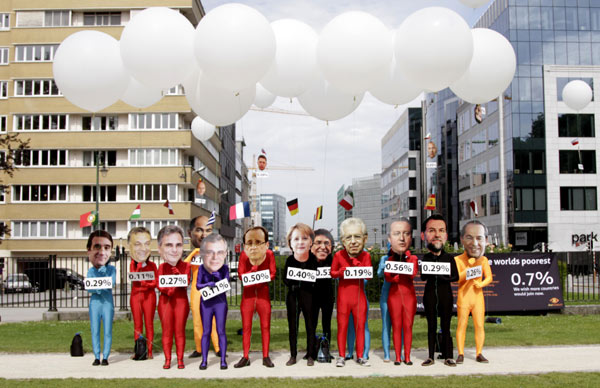
European leaders arrived in Brussels on Thursday afternoon for a two-day summit that some observers are calling the last chance to save the euro.
 |
|
Protesters hold masks of European leaders and pose for a group photo as they demonstrate outside the EU summit in Brussels on Thursday. Virginia Mayo / Associated Press |
European Council President Herman Van Rompuy said the summit will be held on two tracks, aiming to strengthen economic union by beefing up fiscal regulations and boosting economic growth at the same time.
He said the "challenge for this European Council is more than ever before".
When rolling out the agenda, he said the summit will endorse country-specific recommendations to guide policies and budgets, adopt the Compact for Growth and Jobs and launch the final phase of work toward a new Multiannual Financial Framework.
"Last but not least, setting our Economic and Monetary Union on a new path" is also on the agenda, Van Rompuy said in a statement.
Before the summit, French and German leaders met in Paris on Wednesday after they joined Italy and Spain, which has asked for bailout help with Cyprus, to work out a growth pact.
While Spain, Italy and France are expected to float ideas about stimulating economies at the summit, German Chancellor Angela Merkel may oppose them because her country may finance most of them.
Giles Merritt, secretary- general of Friends of Europe in Brussels, said the European Council would once again fail in finding a solution to the current crisis. He said there are many political disagreements among the European political leaders of Germany and France, and Merkel's trip to Paris was a last attempt before the summit.
"She achieved a certain political union with France in calling for EU bonds and pushing for fiscal controls, even beyond the borders of European countries," said Merritt.
But Merritt said fighting the crisis is a "losing battle" and he is very worried about the market's reaction. "Having been told several times it was our last chance, maintaining the market's confidence is no easy task. Sooner or later, the market will collapse, like in the USA in the 1930s or in the 1990s in Asia," said Merritt.
He also said long-term growth and unemployment, which were high on the agenda of the upcoming summit, would appear less important in discussions. What Europe needs is an immediate plan to re-establish the confidence of the financial markets.
George Soros, a Hungarian-American business magnate, has been closely watching the European crisis. Though he insisted that Greece should take on the austerity terms, Soros said Germany should follow the example of the United States after World War II and launch a Marshall Plan.
"I want to draw the parallel between what is happening with the eurozone right now, and what happened after World War II, when the Bretton Woods system of monetary management was created to govern the global economy," he said in a recent interview.
"Then, the US became the center of this system, and the dollar became the dominant global currency. It was a free world dominated by the US," he continued in the interview. Soros went on to say that the US earned that position by providing huge funds for the reconstruction of Europe through the Marshall Plan. The US became a benevolent imperial power, which greatly benefited the US, he said.
"Germany is in a similar position today, but it is not willing to engage in anything like the Marshall Plan. It is opposed to any transfer union for the rest of Europe," said Soros, adding that this summit is the last chance to save the euro.
Contact the writer at [email protected]